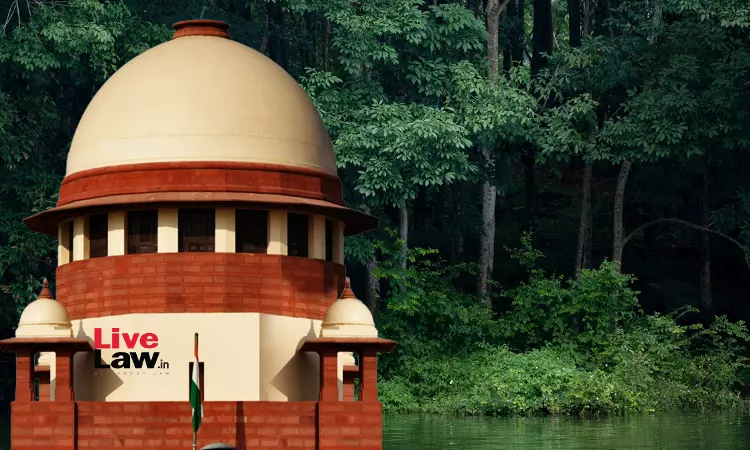- Home
- /
- Top Stories
- /
- Supreme Court Notes Conflict...
Supreme Court Notes Conflict Between Forest Rights Act & Forest Conservation Act On Allowing Houses For Tribes; Seeks Union's Stance
Yash Mittal
11 Oct 2025 9:38 PM IST
The Supreme Court has directed the Union Government to file an affidavit within four weeks clarifying the scope, method, and manner of permitting construction of dwelling houses under the Forest Rights Act, 2006 (“FRA”), in a manner consistent with the Forest (Conservation) Act, 1980 (“FCA”). While the FRA guarantees forest dwellers a 'pucca house,' the FCA imposes restrictions on...
The Supreme Court has directed the Union Government to file an affidavit within four weeks clarifying the scope, method, and manner of permitting construction of dwelling houses under the Forest Rights Act, 2006 (“FRA”), in a manner consistent with the Forest (Conservation) Act, 1980 (“FCA”). While the FRA guarantees forest dwellers a 'pucca house,' the FCA imposes restrictions on such permanent constructions within forest areas.
Opining that the Forest Conservation Act should not prohibit the construction of a pucca house for forest dwellers, the Court asked the Ministry of Environment and Forest and Climate Change and the Ministry of Tribal Affairs to hold detailed consultations.
A bench of Justices PS Narasimha and Atul S Chandurkar heard an appeal where the issue for consideration was of great importance, as the court ought to balance two important legislation; where, to provide minimum basic housing even to those who are forest dwellers under FRA, and on the other side, an obligation of State and its citizenry to protect the national forest resource under FCA.
Noting the divergence between the two laws, the Court observed:
“While Section 4 of the Forest Rights Act, 2006 recognises and vests certain forest rights on the forest dwellers, Section 3, in turn, delineates what those forest rights are. Sub-section (2) of Section 3 empowers the Government to provide certain specified facilities to the forest dwellers, notwithstanding the mandate under the Forest (Conservation) Act, 1980. This exemption under Section 3(2) is only for activities 2 undertaken by the Government, and more importantly it is restricted to activities that are specifically provided therein. This does not include construction of a pakka dwelling house.”
Prima facie, the Court opined that the FCA should not prohibit certain activities (including the construction of dwelling houses), except for the non-forestry use of the forest land.
“We are of the opinion that even assuming that State can permit a minimalistic measure to build a pakka house for forest dwellers, the real question is whether such a measure could be notwithstanding the regulatory mandate of Forest Conservation Act, 1980. The Forest Conservation Act 1980, in our opinion, should not be treated as a law which prohibits certain activities, for it is a legislative measure that introduces the value of regulation and monitoring of non-forest activity within the forest. This is absolutely necessary for safe and good governance of our forest resources.”, the court said.
Thus, it was necessary to balance both the statutes to benefit the forest dwellers, so that “these legislations can supplement and complement one another and can be implemented benefiting the forest dwellers, as they are so inextricably connected to the forest, and at the same time regulate non-forest activity in the forest.”
Accordingly, the Court directed "the MOEF&CC and Ministry of Tribal Affairs to hold detailed consultations and file an affidavit indicating the scope, method and manner of enabling construction of dwelling houses (under the scheme) within the forest, keeping in mind the mandate of Forest Conservation Act, 1980.”
Cause Title: SUGRA ADIWASI & ORS. VERSUS PATHRANAND & ORS.
Citation : 2025 LiveLaw (SC) 995
Click here to read/download the order
Ms. Anitha Shenoy, senior counsel appeared for the petitioner(s), and Ms. Aishwarya Bhati, ASG for respondent(s)



